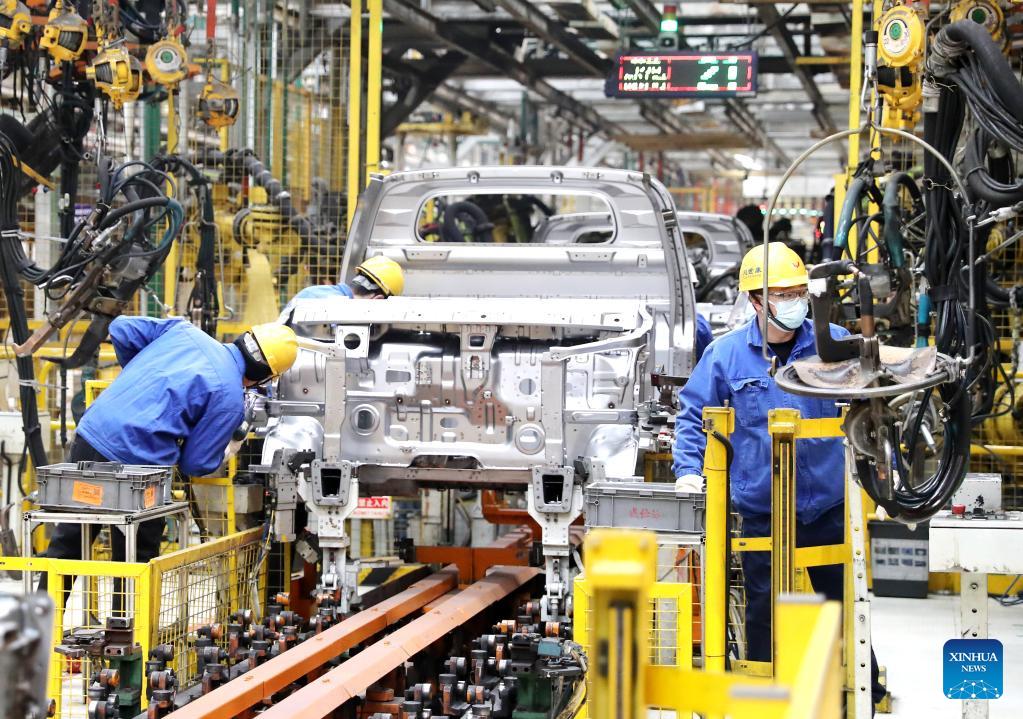Chinese economy gets off to a good start in 2023
 0 Comment(s)
0 Comment(s) Print
Print E-mail Xinhua, January 31, 2023
E-mail Xinhua, January 31, 2023

Staff members work at a workshop of an auto manufacturing enterprise in Qingdao, east China's Shandong Province, Jan. 28, 2023. [Photo/Xinhua]
With long queues outside restaurants, crowded subway cars, and active machines in factories and on building sites, the Chinese economy is shaking off its COVID shadow and has gotten off to a good start in 2023.
Robust consumption
During the weeklong Spring Festival holiday, which ended last Friday, cinemas, restaurants, and tourist attractions were swamped with people eager to meet their pent-up consumption desires.
Cinemas nationwide sold 129 million tickets, generating 6.76 billion yuan (nearly 1 billion U.S. dollars) in revenue in the period, up 11.89 percent year on year. Some 308 million domestic trips were made, with tourism revenues hitting a total of 375.8 billion yuan, up 30 percent.
Better-than-expected holiday spending improved confidence in a services consumption recovery, CITIC Securities said in a report, noting that the catering sector is about to see a stable and sustainable rebound and that tourism will strengthen gradually during peak seasons.
Expanding consumption has become a policy priority.
A State Council meeting on Saturday stressed the need for timely measures to promote an early recovery of consumption as the main economic driving force. Local governments have since January been rolling out favorable policies to improve consumer sentiment.
Shanghai, a mega city in east China, on Sunday unveiled an action plan including purchase tax exemptions for new-energy vehicles and vouchers for sectors such as cultural tourism and catering. Hainan, an island province in south China, has actively promoted duty-free shopping, reporting 5.19 billion yuan in sales from Jan. 1 to 28.
A consumption rebound is a key theme for 2023, UBS economist Wang Tao said, predicting that full-year nominal retail sales will grow 9 percent year on year.
Factories in full swing
Post-holiday production is also picking up across the country, with factories in full swing.
On Saturday, the first business day after the Spring Festival holiday, construction on 136 key projects broke ground in Xi'an, capital of northwest China's Shaanxi Province.
These projects, covering everything from advanced manufacturing to modern services, are expected to have an annual output of over 150 billion yuan and create more than 110,000 jobs.
In the southwestern municipality of Chongqing, more than 60 rotary drilling rigs were in simultaneous operation at a construction site for Changan Auto's new factory in January. "With an investment of 6.3 billion yuan, the project will have an annual capacity of 280,000 new energy vehicles," according to project director Wu Kezhi.
Chongqing is planning to launch 1,123 major projects this year, with total investment up 18.5 percent from a year earlier.
The same vigor can be seen nationwide, as local authorities are making solid efforts to resume production, bringing fresh and sustainable momentum to the economy.
Major economic powerhouses -- Guangdong, Zhejiang, Shandong and Sichuan provinces -- have set their 2023 growth targets at above 5 percent. New measures for this year have been unveiled in local government work reports, and they are expected to boost the high-quality growth of China's economy.
Brightened outlook
The reemerging hustle and bustle across the country has painted an encouraging picture of China's economy after a difficult 2022.
Saturday's State Council meeting urged efforts to promote a steady economic rebound for the beginning of the year.
The meeting underscored the need to facilitate a speedy resumption of business and production after the holiday. Timely measures will be taken to promote an early recovery, advance opening-up in a steadfast manner, and stabilize and upgrade foreign trade and investment.
Global investors and institutions have remained confident in the Chinese economy, and multiple investment banks have upwardly revised their forecasts for China's growth rate in 2023.
Liu Linan, head of China macro strategy at Deutsche Bank, has predicted that the Chinese economy will expand about 6 percent this year and that growth will become even more steady in 2024 as China emerges from the impacts of the three-year epidemic.
After returning to normalcy, and when financial risks tame and pro-growth reforms take effect, China's resilience will also strengthen in the medium-to-long term, Liu said, expressing optimism about the prospects of Chinese assets.
The country's economy has passed its most difficult moment and is expected to achieve an overall recovery and improve this year, with more market vitality unleashed and an accelerated rebound in activity, analysts have said.





